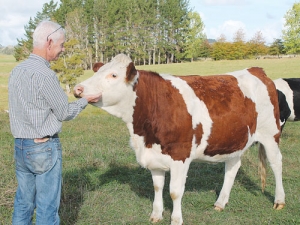Team effort behind cheesemaker’s win
"Right place, right time” is how Bob Rosevear describes the success of his Mahoe Farmhouse Cheese operation.
 Bob Rosevear with Charlotte, a rising two year old – she is 75% Montbeliarde and daughter of the original family.
Bob Rosevear with Charlotte, a rising two year old – she is 75% Montbeliarde and daughter of the original family.
A cow that just needed a home has led to Mahoe progressively taking their full herd across from Friesian to European breeds Montebeliarde and Normande.
They have one Montbeliarde in the milking herd this year. ‘Monty’ was a cow they got about three years ago. She was a house cow that had just calved and needed a home. She looks like a full Montebeliarde but is half.
“We got her by luck but for two or three years she has been our best cow. It doesn’t matter if there is semi-drought up here, she is not a fussy eater.
“She has a very low somatic cell count and she always produces best in the herd – 40 plus litres every day.
“We thought ‘what’s this kind of cow… Montbeliarde?’ We looked her up and found she is a French Swiss cow. Jesse was making French Swiss style cheese and wanted to go further that way.
“We also found another breed Normande. Montbeliarde and Normande after Friesians in Europe are second and third in dairy production. But also they are on the dairy beef side.
“Normande, in particular, are easy calving and are reputed to have unsurpassed marbled beef.
“We have mainly Friesian but also some Jersey and Kiwi Jersey mix; it was easy calving with the Jersey but you can’t do anything with the surplus calves.
“No one wants them and most farmers would put them on the bobby wagon but we refused to do that; we want to give them a chance in life. So when we came across these other breeds, which were perfect for French Swiss style cheese and had sort-after beef calves, it was a no-brainer.”
They have started breeding and next year all 22 replacements will be either half Montebeliarde or half Normande. They now have a part Normande bull and a Montebeliarde bull, the latter bred from Monty and full Montebeliarde semen. They have an embryonic transfer coming on this year which is full Normande; he or she will be a pedigree bull or heifer so it will start multiplying from there.
They are “fascinated with the new breed”.
Mahoe make Dutch style Gouda, Greek style and French style and they will start to take on slightly different flavours with the new milk.
Interest is being shown in the calves including for the marbled beef. “We hope to be a forerunner, we are not the first into it, but we are among the first and there’s a lot of interest.
“Some people have already taken some of the surplus bull calves this year and want to get more next year.”
Acclaimed fruit grower Dean Astill never imagined he would have achieved so much in the years since being named the first Young Horticulturist of the Year, 20 years ago.
The Ashburton-based Carrfields Group continues to show commitment to future growth and in the agricultural sector with its latest investment, the recently acquired 'Spring Farm' adjacent to State Highway 1, Winslow, just south of Ashburton.
New Zealand First leader and Foreign Affairs Minister Winston Peters has blasted Fonterra farmers shareholders for approving the sale of iconic brands to a French company.
A major feature of the Ashburton A&P Show, to be held on October 31 and November 1, will be the annual trans-Tasman Sheep Dog Trial test match, with the best heading dogs from both sides of the Tasman going head-to-head in two teams of four.
Fewer bobby calves are heading to the works this season, as more dairy farmers recognise the value of rearing calves for beef.
The key to a dairy system that generates high profit with a low emissions intensity is using low footprint feed, says Fonterra program manager on-farm excellence, Louise Cook.